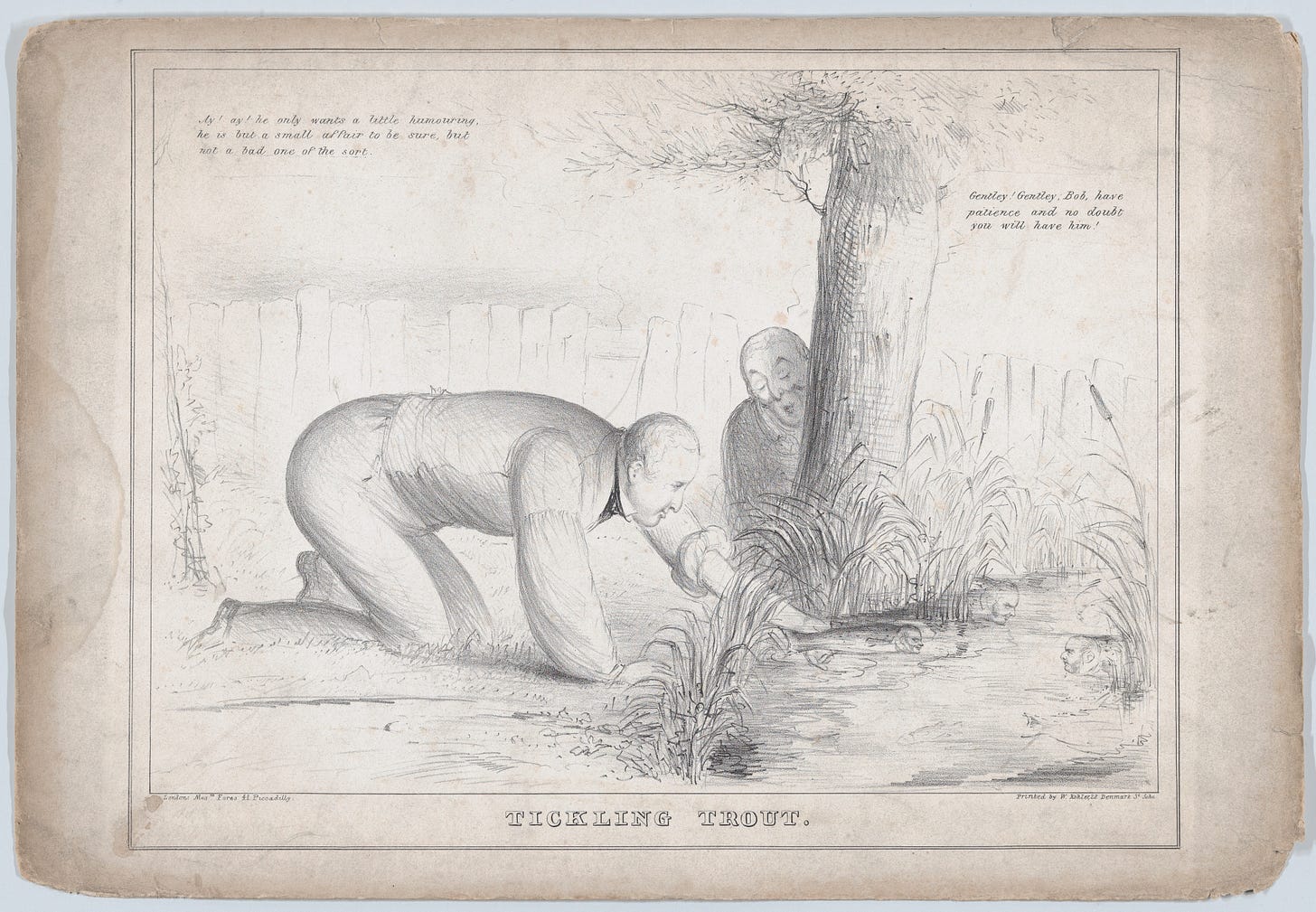Tickling Trout
How to Misappropriate Shakespeare
Misappropriation has become a dirty word these days.
There are good reasons for this. We want a world that attempts to return dignity and rewards to the people that create important ideas and objects. Fair enough, but like many dirty words there is another side, after all language is complicated. I’ll let Finnish comedian, Leikola Ismo cover that for me…
What I want to do is to make a case for a certain type misappropriation. A kind that isn’t looking to extract value from others but instead helps us to think more creatively.
To get there we need to address the fish in the room and get on the same page about tickling trout. As an avid flyfisher, I was pretty excited when I ran across this concept in Shakespeare (Twelfth Night - Act 2, Scene 5).
MARIA: Get you all three into the boxtree. Malvolio’s coming down this walk. He has been yonder i’ the sun practicing behavior to his own shadow this half hour. Observe him, for the love of mockery, for I know this letter will make a contemplative idiot of him. Close, in the name of jesting! Lie thou there for here comes the trout that must be caught with tickling.
Since I had never heard of this wizardry, I did what any reasonable person would do and I asked ChatGPT to show me a Shakespearian image of a trout being tickled. This is what I got and I hope that this will answer all your questions.
No?
I mean it’s amazing but maybe large language models aren’t quite ready to answer all of our questions. So what is trout tickling, why was Shakespeare talking about it, and how could this possibly have anything to do with misappropriation?
It turns out that tickling trout is the practice of approaching a trout from behind and gently rubbing its belly, rendering it into a trancelike state that allows one to move gradually forward until the fish can be grabbed by its gills and pulled from the water. Not quite as cute as it sounds at first, is it?
It would seem this is sort of the upscale version of rednecks noodling for catfish wherein one thrusts a hand down a muddy hole in hopes of being attacked by a catfish which can then be grabbed and hauled out. In the case of Shakespeare’s Maria, Malvolio is the trout who once lulled into passivity, can subsequently be done for.
It is worth noting that in quite a few places trout tickling is in fact illegal. For my part I am still a bit agog at the fact that it is even a thing. If you can actually pull this off I think you probably deserve to have that fish.

Wait… what was supposed to be I talking about?
Ever since I found out about this crazy thing I am constantly distracted by wondering how it came to be, is it really a real thing and why do the fish in the etching above seem to have tiny human faces?!
Actually that is exactly the point. When I am working, especially on something that is a knotty problem, it gets hard to see the things that I am working on clearly. It also gets hard to see anything else and so I feel stuck, in the classic tires in the mud way, expending lots of energy spinning my wheels but getting nowhere. This is where (mis)appropriation walks back on stage. When we appropriate something, we take it and use it for our own purposes. When we misappropriate it, we are taking it when, or in a way, that we shouldn’t. I’m not advocating for that in any way but there is another way to misappropriate which is to use something incorrectly. Not as in you shouldn’t but as in, that’s not at all what was meant by the original.
Any honest creative person knows that there is really nothing new under the sun and that in some way we are always just remixing when we create. But we live in a time where process and reason are supposed justify and sometimes litigate our conclusions. Ownership and user agreements are 13/10ths of the law and even an unjustified accusation of appropriation can have real traction. It’s a lot just to navigate the sea of information we have at our fingertips, never mind how it got there and who owns it.
Certainly acknowledging authorship is incredibly important and anyone who survived Algebra knows we must - always show our work. I’m not suggesting that this is a bad way to go about things for the most part, just that there might be more to it especially when we are trying to be creative. The ability to misinterpret something can be the key to real insight. Sometimes its just the distraction and mental reset that comes from finding out about the weirdest way to catch trout, or maybe the surprising appearance of this in Shakespeare and the inevitable cultural conjecture that it spawns, or even the rabbit hole that it takes me down that makes me think that somehow there is a lesson in all of this about how to free my mind and make me a better more creative thinker.
I think there is a right way to misappropriate that makes us more humble, necessarily generous with our thanks to those on whose shoulders we stand but also allows to add just a little of ourselves to the special sauce that is life.



